Two New GAANN Grants Added to CoE’s Collection
The College of Engineering proudly announces it has received two new Graduate Assistance in Areas of National Need (GAANN) grants from the US Department of Education, bringing Drexel University’s accumulated total to 21 as of this year. CoE has garnered six GAANNs in the past year. The Department of Mechanical Engineering and Mechanics (MEM) won an award that will address critical infrastructure challenges in the workforce; and the Department of Chemical and Biological Engineering (CBE) won an award towards educating energy engineers under their so-called E3 program. Grants are awarded to programs and institutions in order to sustain and enhance the capacity for teaching and research in areas of national need.
Dr. Matthew McCarthy, associate professor of MEM, is the principal investigator on the MEM GAANN; co-investigators are Professor Ying Sun and Associate Professor Antonios Kontsos. Developing the next generation’s engineering workforce to address the technological challenges due to crumbling infrastructure is the central component of the effort. The award provides for six doctoral students who will receive exceptional training in the emerging fields of mechanical engineering that specifically address critical infrastructure challenges facing the US. The scientific discovery and technological innovation will be focused in three sub-areas: (1) structural health monitoring and materials; (2) energy and water infrastructure; and (3) manufacturing and automation.
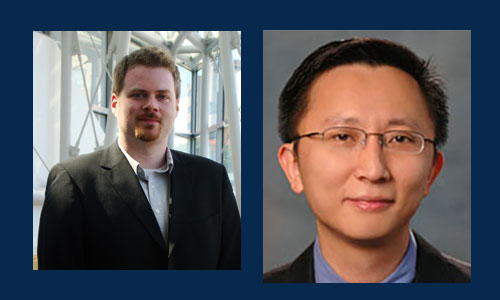
Dr. Matthew McCarthy (l) and Dr. Kenneth Lau
Fellows will be selected based on financial need with a special emphasis on supporting students from traditionally underrepresented backgrounds recruited in collaboration with the Philadelphia Alliance for Minority Participation. Fellows will be exposed to an integrated research, education, and cultural curriculum, and provided with opportunities for industrial experience that will enable them to launch careers in leading US universities and industrial and national laboratories. The Center for the Advancement of STEM Teaching and Learning (CASTLE) will provide special teaching supervision, evaluation, and assessment of the overall program.
Dr. Kenneth Lau, professor of CBE, is the principal investigator on the CBE GAANN; co-investigators are Dr. Cameron Abrams, department head; Professor Jason Baxter; and Associate Professor Vibha Kalra. The objectives of the grant are: (1) to increase the capacity for training chemical engineering graduate students in the latest evidence-based teaching practices as well as cutting-edge sustainable energy sciences, a recognized area of national need, and (2) to support PhD students of exceptional ability and demonstrated financial need, within a program designed to increase the number of women and underrepresented minorities. The National Academy of Engineering recently named “Make Solar Energy Economical” as one of their 14 Grand Challenges for engineering in the 21st century. To address this challenge, GAANN Fellows will pursue the discovery of new, superior materials and the development of novel processes for energy conversion and storage. Students will participate in two of Drexel's nationally recognized programs for learning best-practices in STEM teaching, and will be extensively trained by department faculty through an innovative Instructional Fellows program. The proposed GAANN E3 program will help to provide the highly skilled work force needed to drive discovery, development, and manufacturing solutions for a sustainable energy economy for the nation and will contribute to a more diverse cohort of teachers and professors.
Tang Wins ACSPRF Award
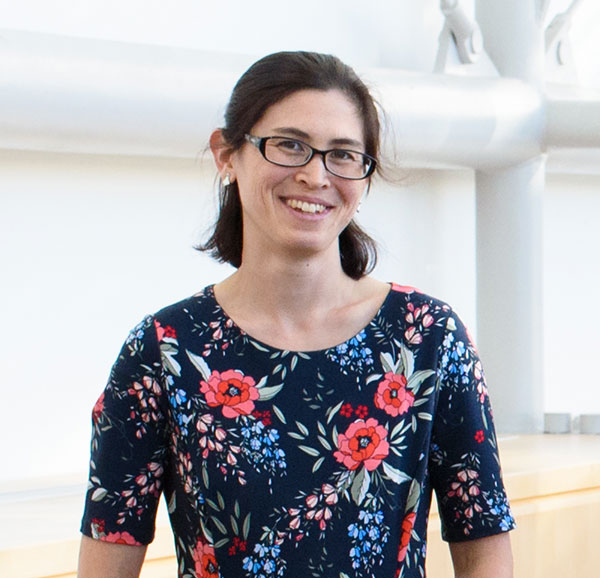
Dr. Maureen Tang
Dr. Maureen Tang, assistant professor in the Department Chemical and Biological Engineering, has been awarded a New Directions grant from the American Chemical Society Petroleum Resource Fund. The project, titled “Uncovering the mechanism of heterogeneous electrocatalytic cyclohexane oxidation,” will award $110,000 over two years. Cyclohexane is a common feedstock for many processes, but it must first be activated into another chemical by selective oxidation. This project will develop a new process for selective oxidation of cyclohexane into cyclohexanol using electricity instead of chemical reagents and heat. The results could greatly improve the efficiency of manufacturing processes, such as nylon production, while providing a method for storing intermittent renewable electricity from wind or solar power.
Dandekar Wins NIH Grant
Dr. Kapil Dandekar, professor in the Department of Electrical and Computer Engineering (ECE), has received a new National Institutes of Health grant for his proposal, “Smart and Connected Health for Newborn Ventilation,” in collaboration with co-investigators Dr. Anup Das, assistant professor of ECE; Endla Anday, Pediatrics; Vineet Bhandari, Pediatrics; Genevieve Dion, Fashion Design; Kelly Joyce, Sociology; and William Mongan, Computing.
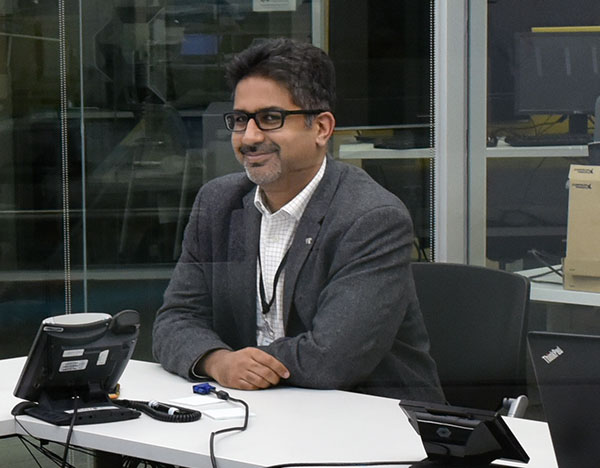
Dr. Kapil Dandekar
“Our objective in this proposal is to develop a smart and connected health solution to unobtrusively and non-invasively monitor newborns. A key outcome of this proposal is the design of a control loop to intelligently synchronize newborn breathing with an external ventilator to provide invasive as well as non- invasive ventilation,” according to the proposal.
“While flow sensors in the endotracheal tube (ETT) can provide effective synchronization, they significantly increase the size, form-factor, and hence, the cost of the ETT. Instead, this proposal will use our unique fabric-based biomedical sensors, which will enhance non-invasive ventilatory assistance and decrease lung injury. Building upon our past work on designing biomedical functional fabrics, we will leverage human factors analysis to incorporate stakeholder (e.g., patients’ parents, nurses, doctors) feedback early in the design process to reduce the barriers to technology adoption for our non-invasive sensors to provide synchronization, both in the invasive and non-invasive modes of assisted ventilation, to the neonate.”
ECE Alum in Running for Small Business Owner Contest
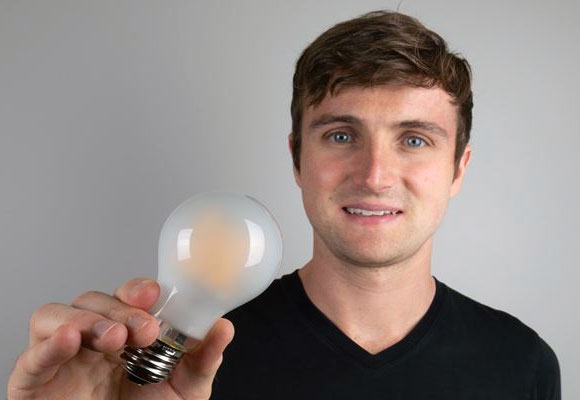
Greg Yeutter
Greg Yeutter, BS/MS-EE '06, has been selected as one of six finalists in Amazon's inaugural “Small Business Owner Under 30 of the Year Competition.” The winner of the competition will be selected via a public vote on Amazon's website. Yeutter was chosen because of the business he has built around his invention, the Bedtime Bulb. The Bedtime Bulb is engineered to emit colors scientifically-demonstrated to create a calm and relaxing atmosphere. The intention is for users to employ the Bedtime Bulb in the evenings, thereby improving sleep. Yeutter's invention is the next step in the journey he's been on since he conducted research in Drexel’s dLUX lab, which studies light "and its effect on life and energy use." Yeutter and the Bedtime Bulb were recently featured in Business Insider. Those with an Amazon account can log on and check out the finalists, and vote for the winner. (By Jeff Birou.)
Materials Alumna Wins Renewable Energy Award
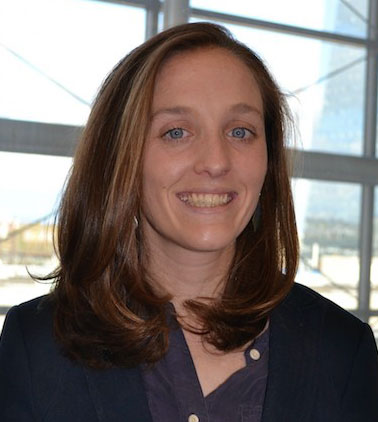
Kelsey Hatzell
Materials PhD alumna Kelsey Hatzell, currently assistant professor of Mechanical Engineering and Chemical and Biomolecular Engineering at Vanderbilt University, has won the 2019 MRS Nelson “Buck” Robinson Science and Technology Award for Renewable Energy. Hatzell defended in 2015, and her thesis topic was “Conducting (Suspension) Flowable Electrodes for Water and Energy Technologies.”
The award recognizes a student (bachelor’s, master’s or PhD), postdoc or other young professional through five years following the highest degree attained for the development of novel sustainable solutions for the realization of renewable sources of energy. The annual award consists of a $5,000 honorarium.
Farnam Receives NSF Grant
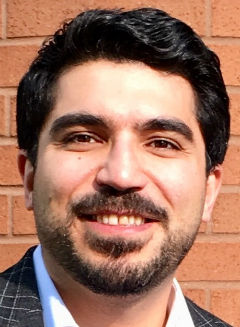
Dr. Yaghoob Farnam
Dr. Yaghoob Farnam, assistant professor in the Department of Civil, Architectural and Environmental Engineering (CAEE), has received a $266,000 award from the National Science Foundation (NSF) to develop a scalable lightweight aggregate (LWA) manufacturing technology from waste coal combustion ash (CCA). In partnership with industrial entities including Talen Energy and AeroAggregate LLC, the project will find solutions to clean the waste coal ash landfills by producing a scalable, industrial level LWA. It will formulate, develop and validate an innovative scalable thermodynamic-based manufacturing technology that can be adopted with CCA chemical and physical properties to successfully produce LWA.
In a related matter, Farnam’s PhD student, Mohammad Balapour, has published in the Journal of Cement and Concrete Composite with a paper titled, “Potential use of lightweight aggregate (LWA) produced from bottom coal ash for internal curing of concrete systems.” This work was completed with Professor Grace Hsuan and Associate Professor Sabrina Spatari, both CAEE; Dr. Edward Garboczi from the National Institute of Standards and Technology; and former PhD student, Professor Pieter Billen from the University of Antwerp, Belgium. The paper evaluates the potential use of a novel lightweight aggregate (LWA), and spherical porous reactive aggregate (SPoRA), produced from waste coal bottom ash, for internal curing of concrete.
Gogotsi Presents Symposia
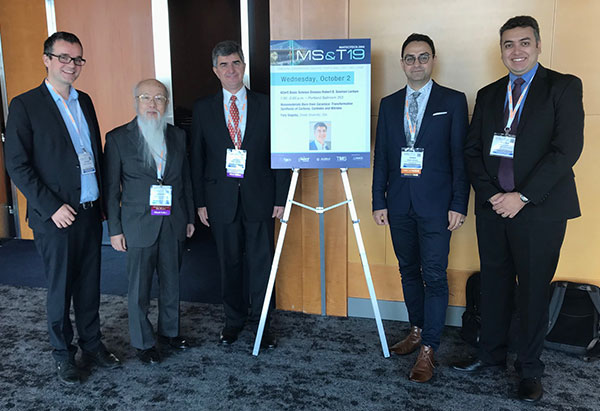
Dr. Yury Gogotsi (third from left)
Dr. Yury Gogotsi, distinguished university professor in the Department of Materials Science and Engineering (MSE), presented the plenary Robert B. Sosman lecture at the annual meeting of The American Ceramic Society in Portland, Oregon in October, where he was also honored as the recipient of the Sosman award. The award is given in recognition of outstanding achievement in basic science in an area that results in a significant impact to the field of ceramics.
Gogotsi’s lecture, organized by alumnus Dr. Babak Anasori, PhD ’16, was titled, “Nanomaterials Born from Ceramics: Transformative Synthesis of Carbons, Carbides, and Nitrides.” At the event, Gogotsi joined several presenters, including his post-doc advisor Dr. Masahiro Yoshimura, as well as former students and postdocs, friends and collaborators. The yearly ACerS event offered nearly 100 technical sessions and drew 2,900 people from 47 countries.
Montalto Receives NOAA Grant
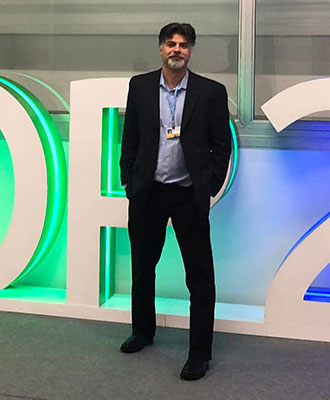
Dr. Franco Montalto
Dr. Franco Montalto, professor in the Department of Civil, Architectural and Environmental Engineering (CAEE), has received a Coastal Ocean Climate Applications and Sectoral Applications Research Programs grant from the National Oceanic and Atmospheric Administration (NOAA). He will be working with Dr. Philip Orton of the Stevens Institute of Technology to model compound flooding in the Eastwick section of Philadelphia. Eastwick is a low-lying neighborhood in southwest Philadelphia located at the confluence of the Darby and Cobbs Creeks with the Delaware River. The neighborhood is susceptible to both rainfall-induced and storm surge-induced flooding (a phenomenon referred to as compound flooding when they occur together). Building off of previous community engagement activities conducted by Montalto’s team in the community, Korin Tangtraklul, the Sustainable Water Resource Engineering Lab’s new Sustainability Manager, will be conducting stakeholder workshops to incorporate local knowledge into the model development process, to validate the model output with historical observations, and to solicit community input in the development of adaptation scenarios for consideration.
Olson and Grad Students Attend Peace Conferences
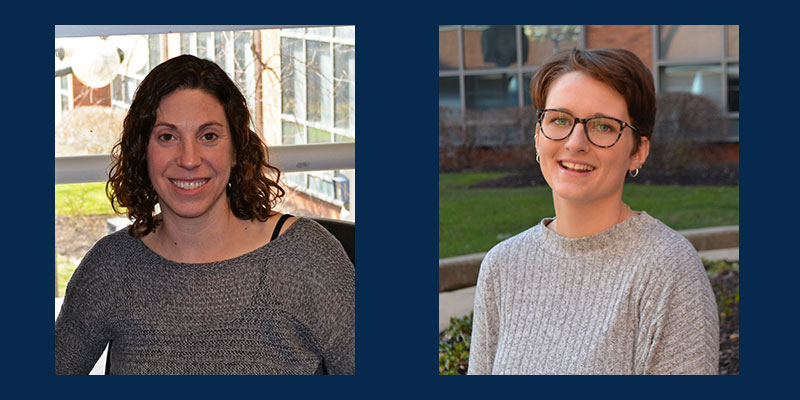
Dr. Mira Olson (l) and Savanna Michener
Dr. Mira Olson, associate professor in the Department of Civil, Architectural and Environmental Engineering (CAEE), and Peace Engineering MS student Savanna Michener attended the First International Conference on Peacebuilding at the University of California Irvine. The conference brought together academics, practitioners, and decision makers to examine the links between environment, conflict, and peace. Michener presented work on “Strategic entry points for implementation of renewables to improve sustainability and peace outcomes.”
In addition, Olson, Michener, and MS student Kala Morgan attended PeaceCon 2019 in Washington, DC. There, Olson was a panelist addressing the issue: “Can we innovate our way to peace? Establishing the field of Peace Engineering.”
Hoque Gives Talk on Sustainable Infrastructure
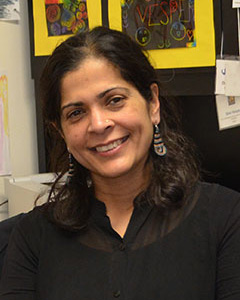
Dr. Simi Hoque
Dr. Simi Hoque, associate professor in the Department of Civil, Architectural and Environmental Engineering (CAEE), recently gave a presentation on sustainable urban infrastructure at an NSF-funded workshop, “How does infrastructure shape equity and well-being across the urban-rural gradient?” The workshop took place at Temple University in September. The workshop was funded by the NSF Sustainable Urban Systems program, and was a collaborative effort among researchers in geography, social science, environmental science and engineers. Hoque and Professor Franco Montalto were both co-investigators and contributors to the project.
In addition, Hoque has officially started a research project at the Children’s Hospital of Philadelphia to examine how thermal, acoustic, and luminous environments shape patient health and wellbeing. She is working one day a week during the fall term at CHOP on this research project.